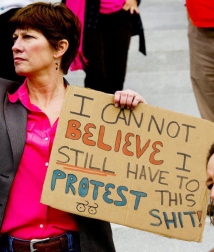 Many years ago, before becoming a pastor had ever crossed my mind, I was a pastor’s wife. One day, I received a package (actually I think it was addressed to the church with the directive to give it to the pastor’s wife). It was a copy of Marabel Morgan’s book, The Total Woman. Enclosed was a letter inviting me to start a women’s group discussion of the book at the church. This was 1974 and The Total Woman had become the bible of those opposed to the women’s movement. Morgan’s advice was directed to married women and came straight out of evangelical Christian theology: “Wives, submit to your husbands as to the Lord.” (I think this translation is from The Good News Bible). As Morgan wrote: “It’s only when a woman surrenders her life to her husband, reveres and worships him and is willing to serve him, that she becomes really beautiful to him.” The book is famous for advice such as greeting your husband at the door when he returns from a hard day of work in a sexy outfit or, better yet, naked and wrapped completely in Saran Wrap. (If you weren’t around for this silliness, watch Kathy Bates in Fried Green Tomatoes to see predictable consequences!)
Many years ago, before becoming a pastor had ever crossed my mind, I was a pastor’s wife. One day, I received a package (actually I think it was addressed to the church with the directive to give it to the pastor’s wife). It was a copy of Marabel Morgan’s book, The Total Woman. Enclosed was a letter inviting me to start a women’s group discussion of the book at the church. This was 1974 and The Total Woman had become the bible of those opposed to the women’s movement. Morgan’s advice was directed to married women and came straight out of evangelical Christian theology: “Wives, submit to your husbands as to the Lord.” (I think this translation is from The Good News Bible). As Morgan wrote: “It’s only when a woman surrenders her life to her husband, reveres and worships him and is willing to serve him, that she becomes really beautiful to him.” The book is famous for advice such as greeting your husband at the door when he returns from a hard day of work in a sexy outfit or, better yet, naked and wrapped completely in Saran Wrap. (If you weren’t around for this silliness, watch Kathy Bates in Fried Green Tomatoes to see predictable consequences!)
Needless to say, I threw the book away and did not wrap myself in cellophane nor  encourage other women to do so. I also wrote back to whatever group it was who had sent me the dastardly thing and excoriated them for assuming that all Christian women would subscribe to such nonsense.
encourage other women to do so. I also wrote back to whatever group it was who had sent me the dastardly thing and excoriated them for assuming that all Christian women would subscribe to such nonsense.
Fast forward 40+ years and here we are wondering why white evangelical women voted for and still support He Who Shall Not Be Named. How could it be that we did not dismantle patriarchy back in the 1970s? And I keep wondering when are we going to get serious about the religious roots of misogyny that continue to affect all women – religious or not.
So I was intrigued by the article that crossed my desk last week entitled “Internalized Misogyny: When Women Are the Part of the Patriarchy Problem.” It’s actually part of an interview with author Rev. Erin Wathen about her new book, Resist and Persist: Faith and the Fight for Equality (which I immediately ordered). It’s only part of the interview, but you can access a video of the entire segment. It’s well worth listening.
Her definition of internalized misogyny:
Basically, internalized misogyny is when women have so thoroughly bought into the lie of patriarchy and the assumption of male power and superiority that they work against their own interests in order to uphold that system. And a lot of times it’s because it’s what is comfortable. Often times, buying into what is is more comfortable than recognizing the deep brokenenness there, the pain of how it has affected women’s lives for generations, and how it continues to harm women. It’s when you have just internalized that message so deeply that you are just as complicit in sustaining the system as men are.
To me, that is such a no-brainer. I’m grateful to Erin Wathen for bringing it to the surface so clearly. And I know I shouldn’t be surprised by some of the ignorant comments following the article: words like “pitiful” and “shallow,” and this gem: “Internalize (sic) misogyny? Sounds like people engaging in mind reading. It seems that once Erin tosses reason to the wind, the only thing left is pejoratives and labels.”
My word(s): typically dismissive. Ask any woman pastor. I bet most of them will tell you that they’ve received a hard time from some of the women in their congregations. My theory has always been that I represented a threat to the power that they had carved out in the church. That power was often subversive, deferential to men, and suspicious of female leadership. In the church, they can easily use biblical passages to back them up, but it’s internalized misogyny just the same. That’s why it’s so important to get at the roots of it embedded in our scripture, liturgies, hymns, prayers, etc. Exclusively masculine language for humanity and for the Divine continues to reinforce patriarchy throughout our church – and culture.
 And this is not just an issue for evangelical churches. Mainline Protestant denominations have been slow to respond, but seem to be creeping forward a bit. The Episcopal Church is wrestling with it now; see “Is God male? The Episcopal Church debates whether to change its Book of Common Prayer”.
And this is not just an issue for evangelical churches. Mainline Protestant denominations have been slow to respond, but seem to be creeping forward a bit. The Episcopal Church is wrestling with it now; see “Is God male? The Episcopal Church debates whether to change its Book of Common Prayer”.
The Evangelical Lutheran Church in America (ELCA) is also working on a new Social Statement on Women and Justice which calls for a commitment to inclusive and expansive language. My reaction: about damn time. We were arguing about this when I was in seminary in the 80s.
So I’m looking forward to the arrival of my new book. Maybe I’ll send out copies to all the women I know and start a discussion group about it. It worked for Marabel Morgan 40+ years ago. Maybe we can smash this patriarchy yet!